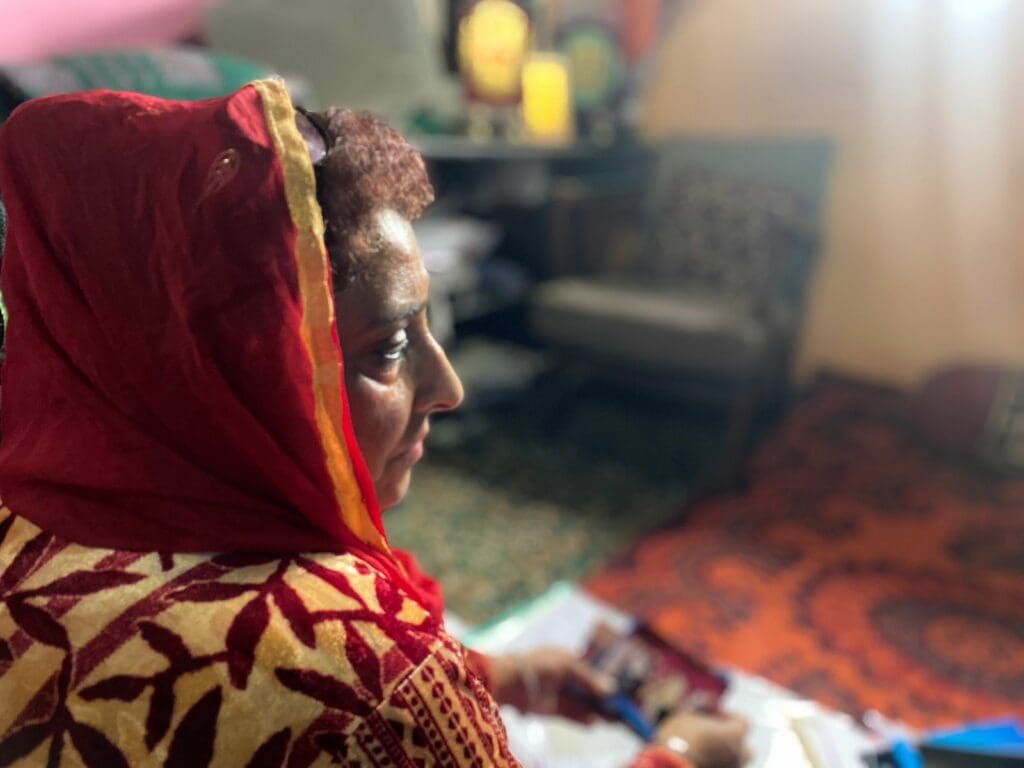
Farhat Siddique, one of the pioneering female theatre artists of Kashmir, defied societal norms and joined the public broadcasting service Doordarshan in 1990, during the height of militancy in Kashmir. She reminisces, “At that time, no women dared to join theatre, but I was the only one who walked through the roads to downtown Srinagar for Doordarshan.”
Initially joining Doordarshan as a child show host, Farhat’s talent was soon recognized by the directors, who gave her an opportunity to perform in theatre as well. Her first theatre play was the Kashmiri drama “Tikk Lal,” produced by Sheikh Mujahid Drama, which turned out to be a tremendous success. Farhat shares, “People started to recognize me after that show. I played a typical character named Ice Cream, and whenever I walked down the street, people would point and say, ‘See, Ice Cream is going.'”
However, her newfound popularity came with challenges. Farhat’s relatives stopped talking to her and harassed her father, expressing disapproval of women working in television. Undeterred, Farhat worked hard to establish herself as a symbol of theatre in Kashmir, portraying each character with excellence despite her young age at the time of joining Doordarshan.
Farhat gained experience by observing various artists and didn’t receive formal training, stating, “For theatre, I joined the Kashmir Kala Manch Drama Club. But for Doordarshan, I never went for training. I have worked in many theatres across Kashmir, including Baramulla and Kashmir Valley Theatre. Although I can’t recall the exact years, I remember performing during the Bud Shah Festival, where I used to do three to four shows a day. Due to this, Vaid Rahi used to call me ‘Farhat Festival.'”
When Doordarshan closed its doors on artists like Farhat, she took the initiative and started her own drama club called “Mehak Drama Club” in 2014. Today, the club has at least 15 people associated with it. However, the non-release of payments by Doordarshan since 2011 has caused immense suffering for Farhat and her team.
To make ends meet, Farhat and her husband perform outside Kashmir. However, the rise of the internet has led to a decline in theatre attendance, as she laments, “In the beginning, we used to sell cassettes here as well. Everything was working smoothly. But now, YouTube and other streaming platforms have left us with nothing. You can see piles of cassettes ready to sell, but no one is taking them.”
Throughout her journey, Farhat’s brother and husband have provided unwavering support. She acknowledges, “It was because of my brother initially that I joined this field. Later, my interest kept growing, and it would not have been possible without his immense support. Today, my husband motivates me to keep going. I am thankful to both of them.”
Despite attempting to shift to other occupations, Farhat’s fame hindered her prospects. Recounting her experiences, she shares, “Whenever I went for an interview, people recognized me. They would tell me they were big fans and felt I shouldn’t work in those sectors as they had witnessed my talent on screen. This left me increasingly disappointed.”
As a result of her continuous struggles, Farhat was compelled to continue working as an artist. She reveals, “Today, I am continuing my work as an artist. We receive small-scale projects sometimes from the Information Department and Cultural Academy. However, Doordarshan has closed its doors on artists, withholding our payments. Despite going to court multiple times and receiving orders to release our salaries, they have not done so.”
Farhat currently operates the Mehak Drama Club from a single rented room. However, the economic crunch has severely impacted her mental and physical well-being. She expresses, “I am not able to sleep at night. I wonder what our future and the future of our kids will be. I feel anxious whenever I remember how hard I worked for it and what I got at the end.”
Offering advice to youngsters, Farhat advises them to refrain from pursuing cinema as a profession. She asserts, “Do it as a hobby, don’t take it as your profession. It will ruin your life. It has no scope in Kashmir. No matter how hardworking or talented you are, you won’t get anything in return. It will be a total waste of your life.” She sighs, reflecting her disappointment.
Farhat appeals to the governor’s administration to intervene in this matter. She explains, “I have always appealed to the governor’s administration to provide us with schemes, but they have consistently turned a deaf ear towards our agonies. Today, through Maktoob, I want to appeal again. Kindly look into our matter and try to find a solution. Otherwise, all artists will perish.”
Sadaf Shabir and Fahim Mattoo are independent journalists in Kashmir.



